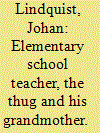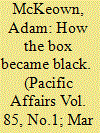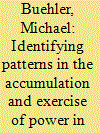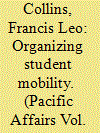|
|
|
Sort Order |
|
|
|
Items / Page
|
|
|
|
|
|
|
| Srl | Item |
| 1 |
ID:
110227


|
|
|
|
|
| Publication |
2012.
|
| Summary/Abstract |
This article considers the emergence of informal brokers in the context of an increasingly formalized regime of transnational labour migration from Indonesia. Following the 1997 Asian economic crisis and the fall of the Suharto regime, there has been a dramatic increase in documented transnational migration to Malaysia at the expense of undocumented migration. In this process, a growing number of private agencies have come to control the increasingly deregulated market for migrant recruitment. These agencies, in turn, depend on informal brokers who recruit migrants in villages across Indonesia to work on palm oil plantations and as domestic servants in countries such as Malaysia and Saudi Arabia. This article takes these informal brokers as a starting point for considering the current Indonesian migration regime, using ethnographic data from the island of Lombok. Along with offering a description of brokering practices, the article argues that the dual process of centralization of migration control and fragmentation of labour recruitment has created a space of mediation for individuals who can navigate bureaucratic process while embodying the ethical qualities that convince Indonesian villagers to become migrants.
|
|
|
|
|
|
|
|
|
|
|
|
|
|
|
|
| 2 |
ID:
110228


|
|
|
|
|
| Publication |
2012.
|
| Summary/Abstract |
In the last two decades, there has been a dramatic rise in international marriages in East and Southeast Asia. A large proportion of these have been between men from wealthier countries and women from poorer countries, many of which are mediated by commercial matchmaking agencies. Agencies that offer men instant marriages with Vietnamese women began to make an appearance in Malaysia in the early 2000s, following closely behind Singapore and Taiwan. In this paper, we use the concepts of objective centrality and social capital to examine three interfaces that marriage brokers in Malaysia have to bridge: the interface with male clients, with access to the supply of potential brides from Vietnam, and with the bureaucratic procedures of immigration and marriage registration. We present one story in greater depth to illustrate the sociability and social capital accumulation process of one Vietnamese bride as she works to establish relationships of trust with her husband and his family. As she makes the transition from marriage migrant to "good wife," she is able to access the social networks of her husband and his family to transform herself into a marriage broker, increasing her own autonomy and access to resources in the process. The surface observation that entering the commercial matchmaking industry does not require much economic capital conceals the considerable amount of social capital that is required.
|
|
|
|
|
|
|
|
|
|
|
|
|
|
|
|
| 3 |
ID:
110225


|
|
|
|
|
| Publication |
2012.
|
| Summary/Abstract |
Migration brokers and the organization of human mobility did not always exist in a black box. Before the early twentieth century, most attention from lawmakers, journalists and reformers actually focused on brokers and the infrastructure of human movement. By the late nineteenth century, however, three processes had begun to push migration brokers and infrastructure out of the limelight: 1) brokers and middlemen were increasingly demonized as the source of migration evils. This happened at a discursive level of depicting brokers as padrones, crimps, smugglers and, more generally, as the remnants of pre-modern culture that undermined the benefits of migration. Laws to regulate brokers also had the practical effect of pushing many brokerage activities underground, even as they created new opportunities for brokers to help migrants negotiate the new legal requirements. This demonization of brokers came hand in hand with 2) the emerging ideal of the "free" migrant as an atomized, self-motivated individual. Brokers were thought to interfere with the freedom that was believed to characterize a genuine migrant. Finally, 3) the new immigration laws of the early twentieth century focused on regulating entry at the border rather than the process of migration, and concentrated on the "free" individual migrant as the legitimate object of selection. The practical enforcement of these laws further made brokers invisible. Today, these combined factors continue to draw attention away from employers of migrants and broader structural processes and onto brokers as explanations for the inequities and exploitation surrounding migration.
|
|
|
|
|
|
|
|
|
|
|
|
|
|
|
|
| 4 |
ID:
110231


|
|
|
|
|
| Publication |
2012.
|
| Summary/Abstract |
The implosion of the New Order in 1998 led to a more democratic political system in Indonesia with elections at all levels of government. A year later, Indonesia also embarked on an ambitious decentralization program that initiated a fundamental restructuring of the country's political institutions on a scale unprecedented since the 1960s. Yet, scholars are still trying to identify clear patterns in the accumulation and exercise of power in this new political environment.
|
|
|
|
|
|
|
|
|
|
|
|
|
|
|
|
| 5 |
ID:
110224


|
|
|
|
|
| Publication |
2012.
|
| Summary/Abstract |
This special issue takes the migrant broker as a starting point for investigating contemporary regimes of transnational migration across Asia. The articles, which span large parts of Asia-including China, Indonesia, Laos, Malaysia, Singapore, South Korea, Thailand, Vietnam, as well as New Zealand-show that marriage migration, student migration and various forms of unskilled labour migration, including predominantly male plantation and construction work and female domestic, entertainment and sex work, are all mediated by brokers. Although much is known about why migrants leave home and what happens to them upon arrival, considerably less is known about the forms of infrastructure that condition their mobility. A focus on brokers is one productive way of opening this "black box" of migration research. The articles in this issue are thus not primarily concerned with the experiences of migrants or in mapping migrant networks per se, but rather in considering how mobility is made possible and organized by brokers, most notably in the process of recruitment and documentation. Drawing from this evidence, we argue that in contrast to the social network approach, a focus on the migrant broker offers a critical methodological vantage point from which to consider the shifting logic of contemporary migration across Asia. In particular, paying ethnographic attention to brokers illuminates the broader infrastructure that makes mobility possible while revealing that distinctions between state and market, between formal and informal, and between altruistic and profit-oriented networks are impossible to sustain in practice.
|
|
|
|
|
|
|
|
|
|
|
|
|
|
|
|
| 6 |
ID:
110230


|
|
|
|
|
| Publication |
2012.
|
| Summary/Abstract |
The movement of international students represents an increasing component of contemporary population mobilities. Like other forms of migration, international student mobility takes place through a complex assemblage of actors and networks, including origin and destination states, educational institutions, families, friends and communities, and of course students themselves. In the midst of these arrangements education agents appear to occupy a pivotal position, serving as a bridge between student origins and study destinations in a manner that enables multiple movements across educational and geographic divides. Establishing and maintaining this important position in international student mobilities is a complex endeavour that requires agents to bridge the gap between a solely profit-oriented education industry and the social lives of students and their families. This paper investigates the position of agents in student mobilities by focusing on the development of export education activities since the early 1990s in New Zealand and the changing relationships of agents with the state, education providers and students. I trace the emergence of agents to the early liberalization of student mobility and educational provision but also note how agents became increasingly incorporated into a more formalized education industry as later governments engaged in more direct intervention and regulation of student flows and educational quality. To broaden this general overview of the role of agents the paper focuses on the specific activities and relationships of agents involved in the movement of South Korean international students. The paper concludes by highlighting the need for research on agents and other intermediaries to focus in more detail on the manner in which these actors mediate different sorts of relationships, between migration/education industries and migrant/student social networks as well as between changing state liberalization and intervention and emerging industry formations.
|
|
|
|
|
|
|
|
|
|
|
|
|
|
|
|
| 7 |
ID:
110226


|
|
|
|
|
| Publication |
2012.
|
| Summary/Abstract |
Private recruitment agents have been a major concern of policy makers in international labour migration. The agents are seen to undermine state authority, the market order and migrant rights. It is commonly suggested that their role can be curtailed or even eliminated if the administrative red tape of migration control is cut down (a liberal approach), or regulation on the intermediary business is tightened up (an interventionist approach). The Chinese government has done both at different times since the 1980s, but only to make the process of recruitment more complicated and private agents more powerful. This paper explains why. Based on a period of seven years of field research and documentary study, the article provides an ethnographic account of the change of the practice of international labour recruitment in China, especially in relation to systemic reforms, between 1980 and 2008. The centralized state in a liberalizing economy seems to need private agents in order to render individual mobility governable, migrants protectable and agents themselves "blamable" and punishable. If limited centralization of state power gave rise to earlier intermediary forms (e.g., tax farming), intermediary agents today result from governmental practices of the highly centralized state. As such, private agents should not be construed as autonomous entities located between demand and supply, or between migrants and states; they are instead an integral part of a complex structure of governance.
|
|
|
|
|
|
|
|
|
|
|
|
|
|
|
|
| 8 |
ID:
110229


|
|
|
|
|
| Publication |
2012.
|
| Summary/Abstract |
This paper sets out to explore the interrelations between safeguarding migration flows between Laos and Thailand and dual models of migrant brokers' subjectivity. Within the anti-trafficking community in the Mekong region there is a tacit dual imagery of "insider" and "outsider" categories, where external brokers are associated with "risk," whereas friends and personal networks within village communities constitute possible avenues for "safe migration." The Thai and Lao governments have over the past years attempted to legalize migration flows. An important rationale for this-which is advocated by international organizations in the Mekong region and elsewhere-is the claim that legalization will "dry out" a market for dubious brokers, making labour migration safer. This paper suggests that what sustains this "legalization model" is an implicit utilitarian view of migration which projects ideal-type depictions of traffickers and brokers. In light of ethnographic data from the commercial sex industry along the Thai-Lao border, this paper suggests that migration networks do not replace brokers, as brokering services are embedded within these very same networks where legality is appropriated as a resource with mixed results. Yet, although legality is being manufactured through the migration process, both consensual and deceptive recruitment (i.e., "trafficking") of young Lao women, is taking place within a context where sex workers themselves play a central role as dilettante-brokers within wider informal social networks. In other words, legality does not alter brokering services, but rather the reverse holds true. "Trafficking," then, is taking place in the very same contexts that are deemed "safe" by anti-trafficking programs.
|
|
|
|
|
|
|
|
|
|
|
|
|
|
|
|
|
|
|
|
|